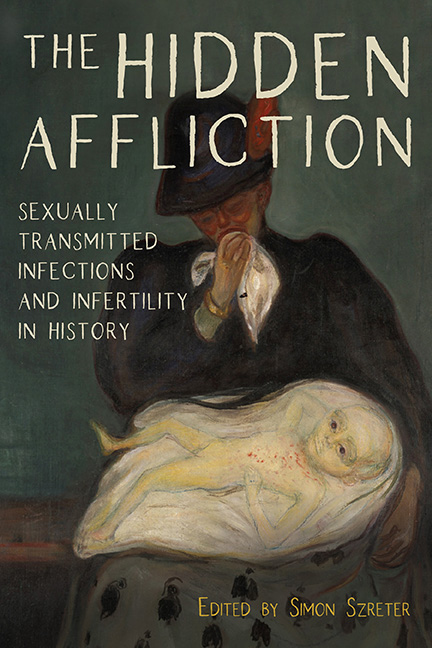Book contents
- Frontmatter
- Contents
- Acknowledgments
- Introduction
- Part One The Hidden Pitfalls in the Early Documentary Record
- Part Two The Biomedical Sciences and the History of the STI Microorganisms
- Part Three Population Decline in the Global South
- 6 Population Decline in Island Melanesia: Aphrodisian Cultural Practices, Sexually Transmitted Infections, and Low Fertility
- 7 Community Infertility in Papua New Guinea: Uncovering the Role of Gonorrhea
- 8 Fertility, STIs, and Sexual Behavior in Early and Mid-Twentieth-Century East Africa
- 9 “A Wise Provision of Nature for the Prevention of Too Many Children”: Evidence from the Australian Colonies
- Part Four Infertility and the Specter of Venereal Diseases in Modern Europe
- List of Contributors
- Index
7 - Community Infertility in Papua New Guinea: Uncovering the Role of Gonorrhea
from Part Three - Population Decline in the Global South
Published online by Cambridge University Press: 25 March 2020
- Frontmatter
- Contents
- Acknowledgments
- Introduction
- Part One The Hidden Pitfalls in the Early Documentary Record
- Part Two The Biomedical Sciences and the History of the STI Microorganisms
- Part Three Population Decline in the Global South
- 6 Population Decline in Island Melanesia: Aphrodisian Cultural Practices, Sexually Transmitted Infections, and Low Fertility
- 7 Community Infertility in Papua New Guinea: Uncovering the Role of Gonorrhea
- 8 Fertility, STIs, and Sexual Behavior in Early and Mid-Twentieth-Century East Africa
- 9 “A Wise Provision of Nature for the Prevention of Too Many Children”: Evidence from the Australian Colonies
- Part Four Infertility and the Specter of Venereal Diseases in Modern Europe
- List of Contributors
- Index
Summary
Population Decline in New Ireland, Papua New Guinea
In this chapter I discuss my own research and clinical experiences in Papua New Guinea, where I worked between 1947 and 1974 and had subsequent visits up until 1987, studying the relationship between community infertility and the prevalence of gonorrhea. Its particular significance for this volume is that this was the first time that a rigorous and systematic clinical and medical examination had been performed on a population suffering from widespread infertility to determine whether psychosocial factors or STIs—and specifically gonorrhea—were the source of the community's infertility. Gonorrhea was, indeed, found to be the cause in the Tabar Islands, and the hypothesis was confirmed by a concurrent program of universal penicillin distribution throughout the Tabar population resulting in a remarkable rebound in fertility and a reversal of the population decline.
I was born in New Zealand, and through to my graduation in medicine had regular contact with Pacific Islanders and missionaries. However, my engagement with New Guinea research began by chance. Medical interns without a family medical background were and are influenced by the role models presented by their teachers. My future career was subtly influenced by Sir John Cleland, professor of pathology, who had studied and written extensively on anthropology and Australian Aboriginal health. He offered me a medical research position in Arnhem Land, but I saw medical positions available in the Territory of Papua and New Guinea. In August 1947 I became the thirteenth medical officer to be appointed after World War II, to a country where the fortunate were receiving medical care from barefoot orderlies, but many others had no medical contact.
There were no numerators or denominators to measure the impact of endemic and introduced diseases on the inhabitants of this tropical environment. In 1948, as medical officer at Sohano on Buka Island, a large island just north of Bougainville Island, I set about establishing medical records and genealogies of two Buka communities: Lemankoa, a large village of the Haku tribe on the northwest coast; and villages of the inland Solas people along the Gagan River. I had access to the birth, death, and marriage records collected by Catholic missionaries since 1915, which were preserved in bound volumes that had been wrapped in banana leaves and hidden in caves during the war.
- Type
- Chapter
- Information
- The Hidden AfflictionSexually Transmitted Infections and Infertility in History, pp. 219 - 248Publisher: Boydell & BrewerPrint publication year: 2019



